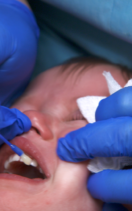While behavior such as brushing with fluoride toothpaste plays an important part in the health of teeth and preventing the development of tooth decay, science is discovering that genetics has a role too. A study entitled “Genes and Their Effects on Dental Caries May Differ Between Primary and Permanent Dentitions” found that, in general, tooth decay in baby teeth was highly inheritable, with genes accounting for as much as 54% to 70% of tooth decay.
This finding is based on a small study, the basis for future large-scale research. It’s an evolving field, and the search is on for specific genes that might be involved in tooth decay.
Also, according to the American Dental Association, babies can “catch” cavities from caregivers through sharing food and utensils. In 71% of the cases, it’s from Mom. Research shows that the cavity-causing germs can be transmitted from moms to infants, even before teeth come in.
The bottom line for the mothers in your program?
- The health of mom’s teeth is important to the health of baby’s teeth. The better mom’s dental health is, the less chance baby will have problems.
- Healthy dental habits such as brushing with fluoridated toothpaste, flossing each day and eating a healthy balance of nutritious foods make sense and can improve the dental health of generations to come.
- Encourage parents not to share food and utensils with babies and not to clean pacifiers with their own mouths.




